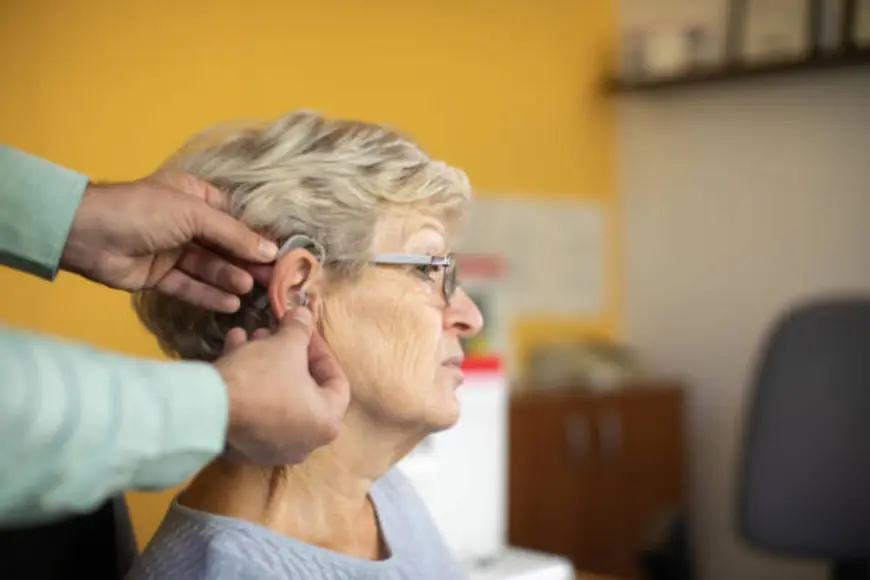Hearing Loss in the Workplace: Awareness and Solutions
Learn how to recognize, prevent, and manage hearing loss in the workplace for safer communication, better productivity, and a healthier work environment.

Hearing loss is a common but underdiagnosed illness in the majority of workplaces around the world. It can occur in anyone, regardless of age or job. Despite that, its influence on employees' safety, communication, and workplace performance is significant. Gaining knowledge about hearing loss in the workplace and developing an appropriate solution can make the workplace safer and more accessible for everyone.
Most individuals with hearing impairments consider hearing aids but always end up considering the hearing aid price Bangalore and how they can get them. Fortunately, with numerous choices, one is able to afford what they need, and thus workers are able to enhance their hearing and remain productive in the workplace.
What is Hearing Loss?
Hearing loss is caused by a decrease in the sensitivity of a person to sounds. It is mild, moderate, or severe. It may sometimes be in one ear and sometimes both ears. Hearing-impaired people can struggle to hear words, especially among noise, or fail to hear significant sounds like alarm or warning beeps.
At work, hearing loss accumulates over the years. Many people are unaware they are losing their hearing until it becomes a problem. In some people, hearing loss results from long-term exposure to loud noise, while in others it is a result of medical conditions or aging.
Why Hearing Loss Matters at Work
Hearing is a critical sense to most work activities. From listening to fellow employees, answering alarms, to instruction following, good hearing keeps the workers safe and productive. Hearing loss, if it occurs, leads to communication breakdowns and errors and misunderstandings ensue.
In certain professions, deafness might be especially dangerous. For example, factory workers, construction workers, or airport staff need to hear alarm noises so as to avoid injuries. If they can't hear the alarms due to deafness, their likelihood of being hurt is higher.
Even in the office or quiet space, hearing loss is stressful and frustrating. Employees can get isolated if they are unable to keep pace with meetings or calls. It can harm teamwork and reduce morale.
Common Causes of Hearing Loss in the Workplace
Noise Exposure: This is the most frequent cause. Tools, equipment, engines, and machinery can damage the small hair cells of the ear responsible for sound signal transmission to the brain. It is cumulative and turns out to be irreversible.
Age: The hearing gets weak with age, and working people may have this even after taking precautions against noise.
Infections or Medical Conditions: Occasionally ear infections, illness, or certain medications can damage hearing.
Lack of Protection: Not wearing earplugs, earmuffs, or other hearing protectors in noisy settings increases risk.
Early Warning Signs of Hearing Loss in the Workplace
Identify early warning signs of hearing loss before they are more serious. Among the most prevalent signs are:
Often needing questions repeated.
Struggling to hear speech in noisy spaces.
Making phone or computer volume too loud.
Being tired or stressed after meetings or speeches.
Not hearing warning or alarm signals.
Ringing or buzzing noises in ears (tinnitus).
How Employers Can Assist: Prevention and Awareness
Employers have the duty to ensure a safe work environment and workers' well-being. Preparing for hearing loss prevention and aiding workers with existing hearing loss are part of this.
Some of the methods through which employers can assist are as follows:
Noise Tests: Take intermittent readings of noise levels within the work area. If loud noise is being generated, steps need to be taken to reduce it.
Supply Hearing Protection: Earplugs, earmuffs, or individually fit equipment should be provided to employees exposed to loud noise.
Train Employees: Educate employees about the dangers of loud noise and how to use hearing protection.
Take Breaks: Offering workers frequent breaks away from noisy areas reduces hearing injury.
Hearing Tests: Offer frequent hearing testing so workers can diagnose problems before they become large.
Increase Communication: Use clear indicators, visual signals, and other assistance to help workers with hearing loss.
Solutions for Workers with Hearing Impairment
If there is hearing impairment in an employee, plenty can be done to help. A consultation from a renowned hearing aid center Trichy or any such center can provide professional advice and the service to utilize devices based on individual needs.
Hearing Aids: These small devices help in sound amplification and ease listening. Modern hearing aids are inconspicuous and very effective.
Assistive Listening Devices: Devices like amplified phones or sound loop systems in meeting rooms allow a person to listen more effectively.
Workplace Accommodations: Adjustments like quieter environments, better lighting, or sitting in a position to hear the speaker better have a significant impact.
Clear Communication: Employees should speak loudly, stand right in front of the individual, and not mute the mouth.
Use of Technology: Captioned video conferencing or speech-to-text cell phone applications might assist with communication.
Flexible Work Arrangements: Telecommuting or flexible hours might reduce stress for some employees with hearing loss.
Why Awareness Makes a Difference
Those with hearing loss are embarrassed or scared to look for help. They hide their problem and thus become frustrated and isolated. Education fosters a climate in which hearing loss is acceptable and understandable.
Education also fosters early intervention. The earlier hearing loss is detected and treated, the better it is for both the employee and the workplace.
Conclusion
Industrial hearing loss is a significant issue but one that can be resolved safely with good information and leadership. Employers who are willing to consider hearing health and respond in kind will not only be protecting their employees but also maximizing productivity and collaboration.
For workers, the early warning signs and easy tools can prevent job satisfaction and quality of life loss. Together, through prevention, awareness, and accommodation, workplaces can be made safer and more accessible to everyone, hearing or not.
If you or someone you know is experiencing difficulty hearing at work, act early. Take care of your hearing and speak out — you're worth it.
What's Your Reaction?
 Like
0
Like
0
 Dislike
0
Dislike
0
 Love
0
Love
0
 Funny
0
Funny
0
 Angry
0
Angry
0
 Sad
0
Sad
0
 Wow
0
Wow
0
















































